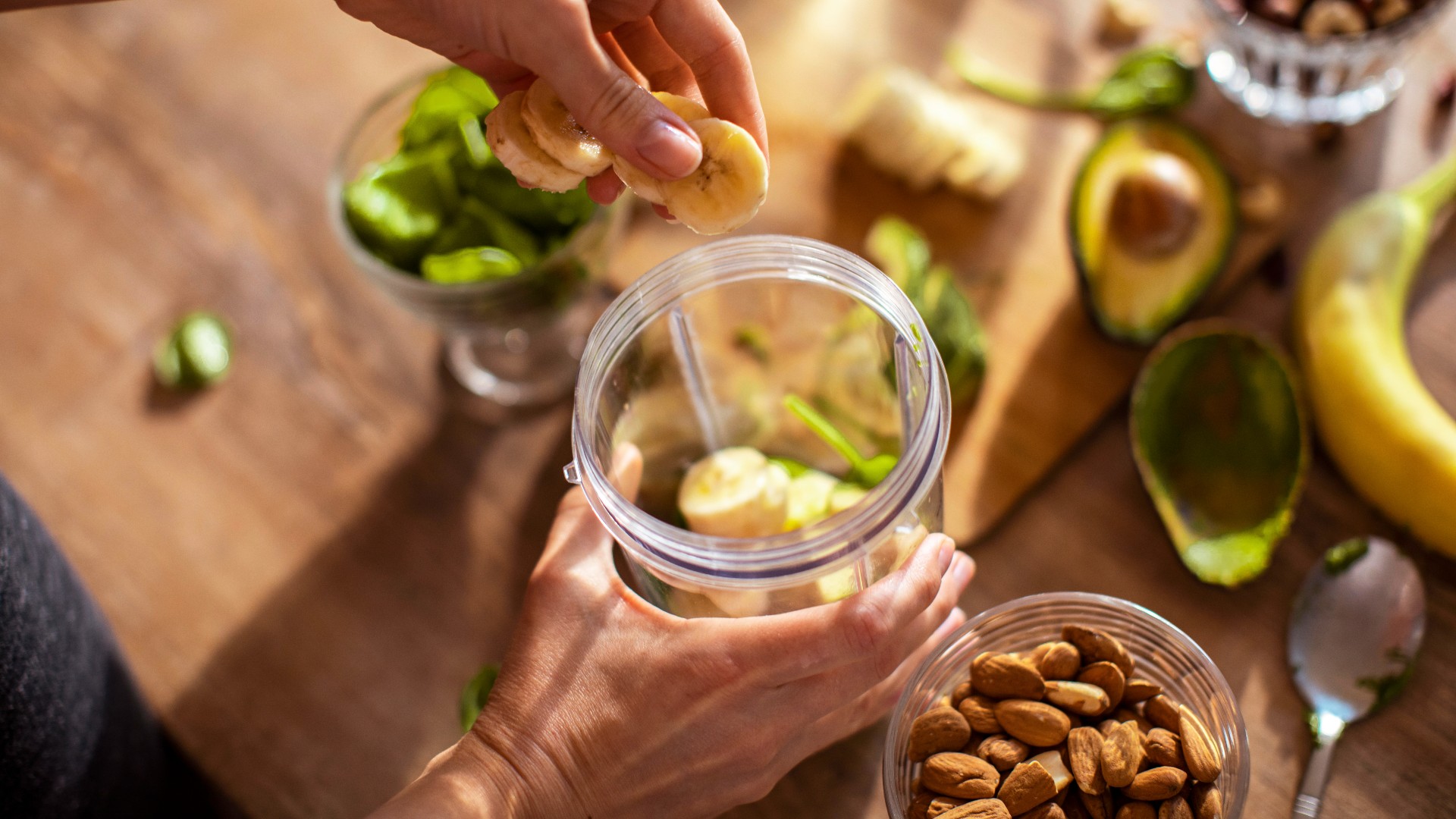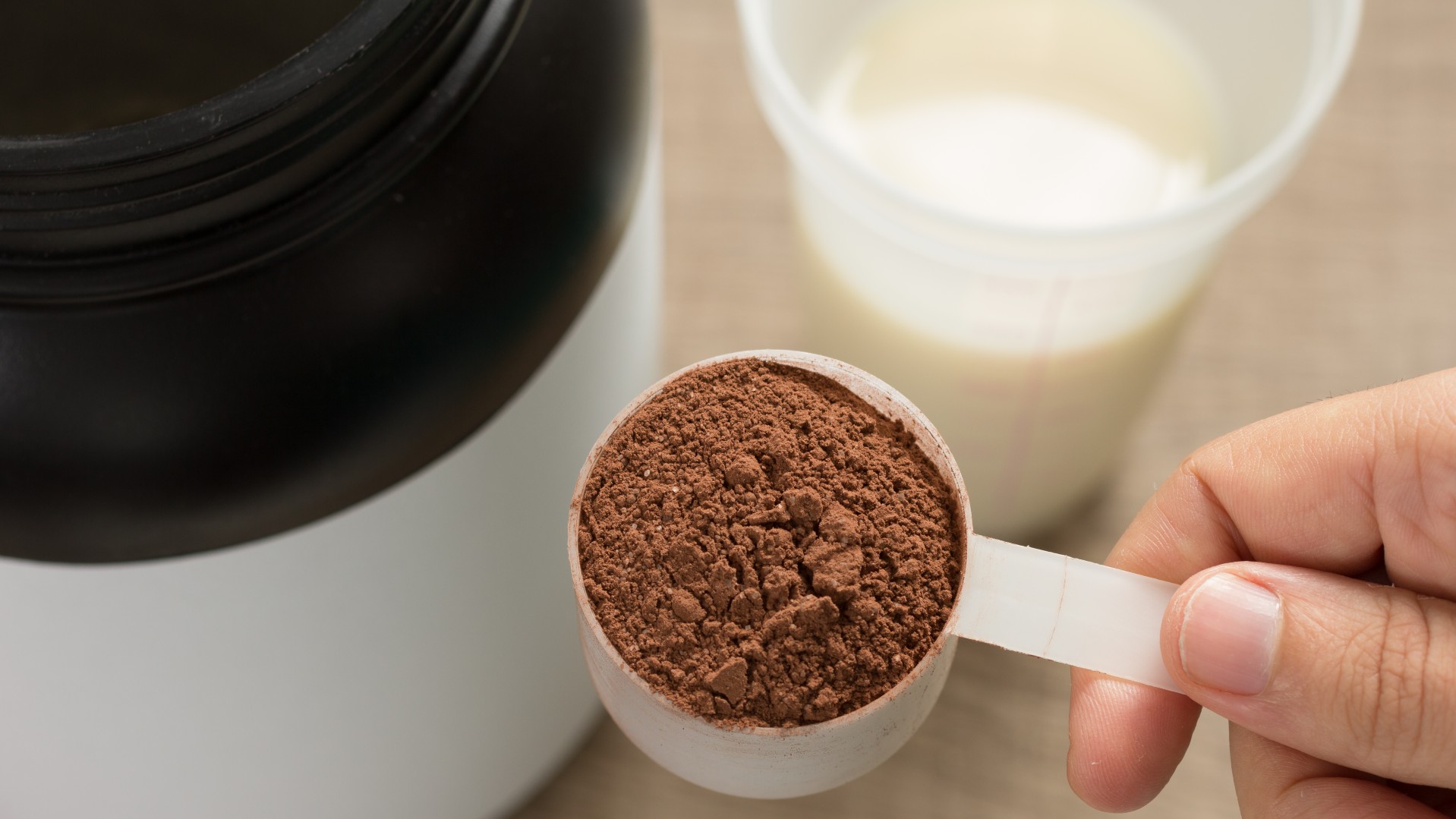
There is much debate about the best time to drink a protein shake, so we decided to cut through the confusion and find out once and for all — when should you drink a protein shake?
If you’ve spotted the bulked-up bros glugging down protein shakes in the gym, one glance might have you wondering just how many protein shakes they’re packing to fuel those sinewed limbs. But while protein quantity matters, so do quality and timing. Keen exercisers well versed in the art of protein shake consumption might have differing opinions, so I decided to drill down on the science.
I enjoy protein shakes, but the majority of protein should ideally come from natural sources. However, if you plan to supplement with protein powders and shakes, you’ll want to learn how to get the most from them. I spoke to Nicky Simbotin of the Sports Nutrition brand Crazy Nutrition who gave me the not-so-crazy answer all of us gym bunnies are after — when should you drink a protein shake? And does it really matter?
Grab one of the best protein shakers and read on to find out.
Benefits of protein and protein shakes
While the benefits of protein are well documented, quality and timing are still up for debate.
“Protein is an essential macronutrient that helps build muscle, repair tissue, make enzymes and regulate hormones,” Simbotin said. In short, protein is kind of a big deal. “Protein powder is a popular nutritional supplement, and can help to aid weight loss and muscle growth alongside a healthy balanced diet and exercise.”
Research has shown that high protein diets are an effective weight loss strategy by reducing hunger, increasing satiety from food, and contributing towards muscle repair and growth. But are protein shakes good for you? Like most supplements, protein powders aren’t regulated by the U.S. Food and Drug Administration for safety and by default, neither are protein shakes.
Sign up to get the BEST of Tom's Guide direct to your inbox.
Get instant access to breaking news, the hottest reviews, great deals and helpful tips.
According to research published by the Harvard School of Public Health, these products are sometimes fortified with extra ingredients like vitamins, thickeners, and sugars. And more often than not, brands touting low sugar, low carb and low fat protein shakes and powders will have added something less than savory in their place.
My advice? Protein shakes are great for topping up your protein intake, but if you plan to invest in a protein powder, always read the label.

When should you drink a protein shake?
According to Simbotin, the best time to have a protein shake depends on your health and fitness goals. So before you sup your next protein shake, check the recommendations below.
When to drink protein shakes for weight loss
“For weight loss, consuming protein-rich snacks like protein shakes between meals is ideal for fat loss. They not only help curb hunger, but you’ll also consume fewer calories,” Simbotin says.
As we mentioned, protein increases satiety, helping you feel fuller and more satisfied for longer.
When to drink protein shakes for muscle growth
To build muscle and strength, you need to consume more protein than your body breaks down during resistance training or weight lifting. In this case, the best time to consume protein for optimal muscle growth is after your workout.
Simbotin explains that to improve exercise, endurance and recovery, combining protein with a source of carbs during and after exercise may improve performance and recovery and reduce soreness. And if DOMs are dampening your fun, the best massage guns can also help soothe sore muscles.
Should you have a protein shake before a workout?
For some people, consuming protein shakes before a workout can increase energy levels. Simbotin advises a protein shake if you struggle to eat breakfast or run a hectic schedule. Not only does a protein shake serve as a quick and easy pre-workout meal, but it’s also easily digestible and won’t bloat you out during exercise.
“The current research shows that pre-workout protein shakes may increase protein synthesis (the process of building muscle) during exercise,” Simbotin says. “Adding protein pre-workout, or during a long workout, is thought to enhance muscle growth and recovery. It also has the potential to increase amino acid uptake — amino acids are the building blocks of protein molecules, like collagen, that help repair and build muscle.”
Should you have a protein shake after a workout?
Simbotin explains that protein powder is an isolated nutrient source and is easily digestible — although some people struggle to digest whey protein. “Protein shakes provide plenty of nutrition for relatively few calories,” she adds. “After exercise, your body needs that nutrition to recover.”
Post-workout, a lack of protein can lead to muscle soreness and fatigue rather than increased strength and stamina, so consuming a shake post-sweat can aid your recovery.
“With age, the metabolic rate slows down. Adding protein into your diet or post-workout can boost your metabolic rate because protein has a much higher TEF (thermic effect of food) than carbohydrates and fat,” Simbotin adds. The result? A pretty desirable metabolism boost.

What time should you have a protein shake?
The best time to consume a protein shake before your workout is 60 to 90 minutes ahead of time. According to Simbotin, this will allow time for better digestion without making you feel sluggish or tired.
On the other hand, she recommends consuming protein within 30 to 60 minutes post-workout, as this will allow your heart rate to return to normal before consuming a meal, and it will provide your muscles with essential nutrients.
It gets more specific if your goal is muscle growth. Research — like this study published in Nutrients — found that per-meal protein quantity and daily frequency both play a role in preserving muscle mass and cited 2 to 3 meals a day containing 25 to 30g of high-quality protein as optimal for stimulating the process of building muscle.
There’s even evidence that consuming a higher dose of protein on one occasion (known as pulse feeding) can stimulate a higher anabolic response (your body’s response to protein) than smaller doses spread over multiple meals.
How much protein do you need a day?
If you’re unsure how much protein you should consume, the National Academy of Medicine recommends that adults consume just over 7 grams per 20 pounds of body weight. But that will differ depending on factors like age, exercise routine and body composition goals.
And most of us aren’t consuming enough! If you want to build muscle, your protein targets will be higher. A protein shake is a great way to top you up, but as a rule of thumb, your protein sources should also vary and come from a balanced diet where possible.
If you’re looking for protein shake recipes, check out this protein shake Chris Hemsworth had on the Thor set

Nicky Simbotin is a personal trainer, exercise referral qualified, and also works with Crazy Nutrition.

Sam Hopes is a level 3 qualified trainer, a level 2 Reiki practitioner and fitness editor at Tom's Guide. She is also currently undertaking her Yoga For Athletes training course.
Sam has written for various fitness brands and websites over the years and has experience across brands at Future, such as Live Science, Fit&Well, Coach, and T3.
Having coached at fitness studios like F45 and Virgin Active and personal trained, Sam now primarily teaches outdoor bootcamps, bodyweight, calisthenics and kettlebells.
She also coaches mobility and flexibility classes several times a week and believes that true strength comes from a holistic approach to training your body.
Sam has completed two mixed doubles Hyrox competitions in London and the Netherlands and finished her first doubles attempt in 1:11.
